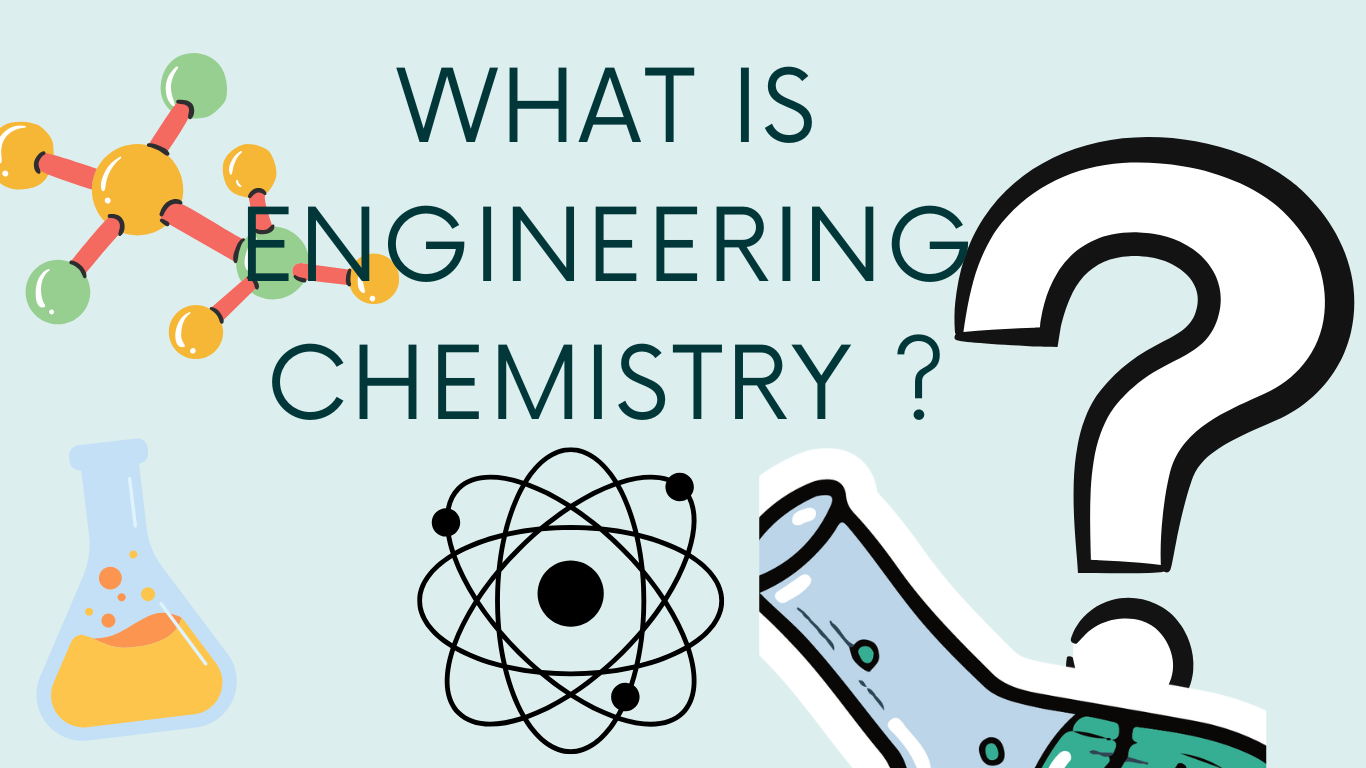Introduction
Engineering chemistry is the study of chemical principles and their applications in engineering and technology. It bridges the gap between pure chemistry and practical engineering solutions, playing a vital role in material science, environmental science, energy production, and industrial processes. This subject is essential for engineers to understand chemical reactions, properties, and applications that influence their work.
This document provides a comprehensive overview of the key topics covered in engineering chemistry, exploring various branches and their industrial relevance.
Chemical Engineering is a branch of engineering that combines principles of chemistry, physics, biology, mathematics, and economics to efficiently use, produce, design, transport, and transform energy and materials. Chemical engineers are responsible for designing processes that convert raw materials into useful products, ranging from food, pharmaceuticals, and energy to advanced materials and chemicals. This discipline involves a deep understanding of the underlying chemical processes and the application of this knowledge to industrial systems and large-scale operations.
1. Introduction to Chemical Engineering
Chemical engineering is a multidisciplinary field that focuses on the application of chemical, physical, and biological sciences to solve problems in the production and transformation of materials. Chemical engineers work in a variety of industries, including petrochemical, pharmaceutical, food, energy, environmental protection, and materials production. The key objective of chemical engineering is to efficiently and sustainably convert raw materials into valuable products that meet society’s needs.
The role of a chemical engineer spans from the laboratory to large industrial plants, from conceptual design to process optimization and safety management. Chemical engineers use their knowledge to create new processes, improve existing ones, and manage production to ensure safety, efficiency, and environmental sustainability.
2. Core Principles of Chemical Engineering
Chemical engineering is rooted in several core scientific principles, which are critical to designing and optimizing chemical processes:
- Mass Balance: The principle of mass conservation is the foundation of all chemical processes. A mass balance ensures that the mass entering a system equals the mass leaving the system, accounting for any accumulation within the system. It is essential for determining the amount of raw material required to produce a desired output.
- Energy Balance: Similar to mass balance, energy balance involves the conservation of energy. It ensures that the energy entering and leaving a system is properly accounted for, including heat, work, and energy transformations within the system.
- Thermodynamics: The study of energy, heat, and work and how they relate to chemical reactions and processes. Thermodynamics is crucial for designing chemical reactors, understanding phase transitions, and optimizing energy efficiency in chemical processes.
- Fluid Mechanics: Fluid dynamics deals with the behavior of fluids (liquids and gases) in motion. Chemical engineers use fluid mechanics to design piping systems, pumps, and reactors, ensuring the smooth flow of materials throughout the process.
- Heat and Mass Transfer: These principles involve the movement of heat and matter in different media. Heat transfer is critical in designing reactors, distillation columns, and heat exchangers. Mass transfer, on the other hand, governs the movement of substances between phases (such as from a liquid to a gas), important in separation processes.
- Reaction Kinetics: Understanding the rate at which chemical reactions occur and the factors that influence them, such as temperature, pressure, and catalysts, is central to designing efficient chemical reactors.
3. Chemical Engineering Process Design
A significant part of chemical engineering is process design, which involves creating and developing new processes for large-scale production or optimizing existing ones. The process design lifecycle includes:
- Feasibility Study: Before designing a chemical plant or process, engineers conduct a feasibility study to evaluate the economic, technical, and environmental viability of the project. This includes market analysis, raw material availability, energy consumption, and environmental impact.
- Process Simulation: Chemical engineers use process simulation software (such as Aspen Plus or HYSYS) to model and simulate chemical processes. These simulations help predict the behavior of processes under different conditions, allowing engineers to optimize them before actual implementation.
- Process Flow Diagrams (PFDs): A PFD is a schematic representation of the major equipment in a chemical process and the flow of materials between them. It is a key tool for process design, helping engineers visualize the entire process and identify key equipment and components.
- Detailed Design: Once the basic process has been conceptualized and optimized, detailed design follows. This involves specifying the design of each piece of equipment, including reactors, heat exchangers, distillation columns, and separators. Engineers also address issues like control systems, safety measures, and waste management.
4. Chemical Engineering Operations
Chemical engineering also involves the operation and management of processes. Chemical engineers must ensure that processes run efficiently, safely, and sustainably. Key operational activities include:
- Process Control: Chemical processes often operate under highly variable conditions. Process control involves adjusting variables like temperature, pressure, flow rates, and concentration to ensure that the process operates within the desired specifications.
- Safety and Risk Management: Given the potential hazards involved in chemical processes, safety is a critical concern. Chemical engineers are responsible for identifying potential risks (such as fires, explosions, or toxic releases) and designing processes and safety systems to minimize these risks. This involves risk analysis, the implementation of safety measures, and the design of emergency response protocols.
- Optimization: Continuous improvement is key to chemical engineering. Engineers use optimization techniques to maximize output, minimize energy consumption, reduce waste, and improve the overall efficiency of the process. Techniques like statistical analysis, machine learning, and advanced control systems are often used in optimization.
- Sustainability and Environmental Impact: Chemical engineers are increasingly tasked with developing processes that are environmentally friendly. This involves minimizing energy consumption, reducing emissions, recycling waste materials, and finding sustainable alternatives to traditional raw materials. Environmental regulations and sustainability goals are crucial factors in process design and operation.
5. Applications of Chemical Engineering
Chemical engineers work in a wide range of industries and applications. Some of the key sectors include:
- Petrochemical Industry: One of the primary sectors where chemical engineers work, the petrochemical industry involves the extraction and processing of oil and natural gas to produce fuels, chemicals, and plastics. Chemical engineers design refineries, distillation columns, and catalytic cracking units to convert crude oil into valuable products.
- Pharmaceuticals: Chemical engineers play a crucial role in the pharmaceutical industry, designing processes for the large-scale production of drugs and biologics. They ensure that these processes are safe, efficient, and meet stringent regulatory standards.
- Food and Beverage: In the food industry, chemical engineers work to design processes for the large-scale production of food products, ensuring that the processes are efficient, cost-effective, and meet food safety standards.
- Energy: Chemical engineers are involved in the production of energy from various sources, including fossil fuels, nuclear power, and renewable energy sources like wind and solar. They design power plants, energy storage systems, and alternative energy technologies to optimize energy production.
- Environmental Engineering: As environmental concerns become more pressing, chemical engineers are also involved in designing processes to reduce pollution, treat wastewater, and develop sustainable technologies for waste management and resource recovery.
- Materials Science: Chemical engineers often collaborate with materials scientists to design new materials with specific properties, such as polymers, nanomaterials, and semiconductors, for use in electronics, aerospace, and manufacturing.
6. Skills and Tools for Chemical Engineers
Chemical engineers need a combination of technical, analytical, and practical skills. Some of the essential skills include:
- Problem Solving: Chemical engineers must be able to solve complex problems related to chemical reactions, process optimization, and system design.
- Mathematical Proficiency: Strong skills in mathematics are essential for chemical engineers to perform calculations involving mass balance, energy balance, and reaction kinetics.
- Knowledge of Chemical Processes: A deep understanding of chemical reactions, thermodynamics, and fluid mechanics is critical for designing and operating chemical processes.
- Computer and Software Skills: Chemical engineers frequently use simulation and modeling software, such as MATLAB, Aspen Plus, and AutoCAD, to design and analyze processes.
- Communication: Chemical engineers need strong communication skills to collaborate with other engineers, managers, and clients, as well as to write reports and present findings.
7. Challenges in Chemical Engineering
While chemical engineering offers numerous opportunities, it also comes with challenges. Some of these challenges include:
- Process Safety: Ensuring the safety of workers and the public in chemical plants is a critical challenge. Chemical engineers must design processes with built-in safety features and respond quickly to emergencies.
- Environmental Sustainability: Developing sustainable processes that minimize waste and reduce environmental impact is becoming increasingly important. Engineers must also comply with ever-stricter environmental regulations.
- Complexity of Processes: Chemical processes often involve complex reactions, fluid dynamics, and heat and mass transfer, which can be difficult to model and optimize.
8. Future of Chemical Engineering
The future of chemical engineering is bright, with emerging fields such as renewable energy, biotechnology, and nanotechnology offering new opportunities. Chemical engineers will play a critical role in addressing global challenges like climate change, resource depletion, and the demand for clean energy.
As technology continues to advance, chemical engineers will develop more sustainable, efficient, and safe processes that meet the needs of society while minimizing environmental impact. The discipline will continue to evolve, requiring engineers to stay abreast of new developments and embrace innovative solutions to global challenges.
1. Basic Concepts of Chemistry
- Atomic Structure and Quantum Mechanics
- Chemical Bonding and Molecular Structure
- Periodic Table and Periodic Properties
- Stoichiometry and Chemical Reactions
- Thermodynamics and Thermochemistry
2. Electrochemistry and Corrosion
- Electrochemical Cells and Electrode Potentials
- Conductance and Electrolytic Cells
- Applications of Electrochemistry in Batteries and Fuel Cells
- Corrosion Types and Prevention Methods
- Electroplating and Protective Coatings
3. Water Chemistry and Treatment
- Water Hardness: Causes and Removal Methods
- Boiler Feed Water and Scale Formation
- Water Purification Techniques
- Industrial Water Treatment
- Desalination and Reverse Osmosis
4. Polymers and Polymer Chemistry
- Classification and Types of Polymers
- Polymerization Mechanisms (Addition and Condensation)
- Properties and Applications of Synthetic Polymers
- Biodegradable and Conducting Polymers
- Industrial Uses of Polymers in Engineering
5. Fuels and Combustion
- Classification of Fuels (Solid, Liquid, and Gaseous)
- Calorific Value and Fuel Efficiency
- Combustion Reactions and Air-Fuel Ratio
- Alternative Fuels: Biodiesel, Hydrogen, and CNG
- Environmental Impacts of Fuel Combustion
6. Nanotechnology and Materials Science
- Introduction to Nanomaterials
- Synthesis and Properties of Nanoparticles
- Applications of Nanotechnology in Engineering
- Carbon Nanotubes and Graphene
- Nano-coatings and Their Industrial Uses
7. Environmental Chemistry
- Air and Water Pollution: Sources and Effects
- Green Chemistry Principles
- Waste Management and Recycling
- Renewable Energy Sources
- Climate Change and Sustainable Engineering
8. Instrumental Methods of Analysis
- Spectroscopic Techniques (UV-Vis, IR, NMR, Mass Spectroscopy)
- Chromatographic Methods (HPLC, GC)
- Thermal Analysis (TGA, DSC)
- Electrochemical Analysis (Potentiometry, Voltammetry)
- X-Ray Diffraction and SEM Analysis
9. Cement, Ceramics, and Glass
- Composition and Manufacturing of Cement
- Types of Cement and Their Properties
- Ceramic Materials and Their Engineering Applications
- Glass Production and Applications
- Refractories and Their Industrial Uses
10. Lubricants and Surface Chemistry
- Classification and Functions of Lubricants
- Mechanisms of Lubrication
- Surfactants and Colloidal Chemistry
- Emulsions and Gels in Engineering Applications
- Surface Coatings and Adhesives
11. Engineering Alloys and Metallurgy
- Types of Metals and Alloys
- Phase Diagrams and Phase Transformations
- Heat Treatment of Metals
- Powder Metallurgy and Its Applications
- Corrosion Resistance Alloys
12. Biomaterials and Pharmaceuticals
- Introduction to Biomaterials
- Polymers in Biomedical Applications
- Drug Synthesis and Chemical Formulations
- Pharmaceuticals and Their Role in Healthcare
- Biocompatibility and Medical Implants
13. Catalysis and Reaction Engineering
- Homogeneous and Heterogeneous Catalysis
- Industrial Catalysts and Their Applications
- Reaction Kinetics and Rate Laws
- Catalysis in Petrochemical and Refining Processes
- Enzyme Catalysis and Biotechnology
14. Energy Sources and Storage Systemshttps://www.thesaurus.com/browse/technical
- Conventional and Renewable Energy Sources
- Solar Cells and Photovoltaic Technology
- Hydrogen Fuel Cells and Energy Storage
- Supercapacitors and Advanced Batteries
- Energy Efficiency in Engineering Applications
15. Green Chemistry and Sustainable Development
- Principles of Green Chemistry
- Sustainable Industrial Practices
- Waste Reduction and Pollution Control
- Development of Eco-friendly Materials
- Circular Economy in Chemical Engineering



